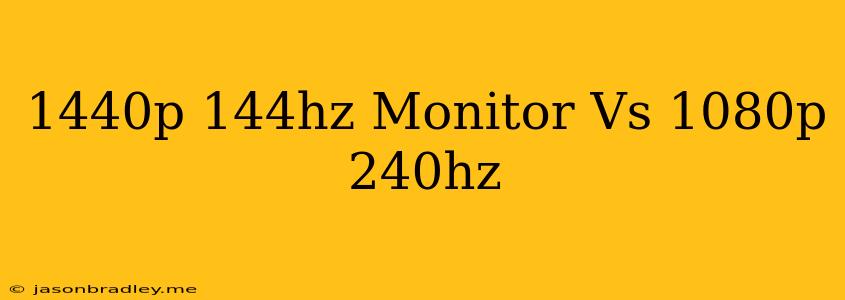1440p 144Hz vs 1080p 240Hz: Which Monitor is Right for You?
Choosing the right monitor for your gaming setup can be daunting, especially with the plethora of options available. Two popular choices often clash: 1440p 144Hz monitors and 1080p 240Hz monitors. Both offer immersive experiences, but they cater to different needs and preferences. Let's dive into the key differences and help you determine which monitor suits you best.
Resolution: Clarity vs. Responsiveness
1440p (2560x1440) offers a higher resolution than 1080p (1920x1080), resulting in a sharper and more detailed picture. You'll notice a significant difference in clarity, especially when playing games with intricate textures and environments.
However, the higher resolution comes with a cost: demanding more from your graphics card and potentially affecting frame rates.
1080p remains the most common resolution and is generally more affordable. It's a good choice for gamers who prioritize high refresh rates and smooth gameplay over pure image detail.
Refresh Rate: Smoothness vs. Visual Fidelity
Refresh rate refers to the number of times the monitor refreshes its image per second. 144Hz offers a smoother experience compared to standard 60Hz monitors, while 240Hz takes things to the next level.
Higher refresh rates translate to reduced motion blur and smoother animations, especially in fast-paced games. This can provide a significant advantage in competitive gaming where split-second reactions are crucial.
While 144Hz is already smooth enough for many, 240Hz pushes the boundaries of responsiveness, offering the ultimate smoothness for those who demand the absolute best.
Choosing the Right Monitor
Here's a breakdown to help you decide:
1440p 144Hz is a good choice if:
- You prioritize visual fidelity and detail.
- You have a powerful graphics card to handle the higher resolution.
- You want a smooth gaming experience but aren't heavily invested in competitive gaming.
1080p 240Hz is a good choice if:
- You prioritize a fast and responsive gaming experience.
- You want the smoothest gameplay possible, especially for competitive titles.
- You have a less powerful graphics card that struggles with higher resolutions.
Ultimately, the best monitor for you depends on your individual needs and preferences. Consider your budget, gaming style, and hardware capabilities before making your choice.
